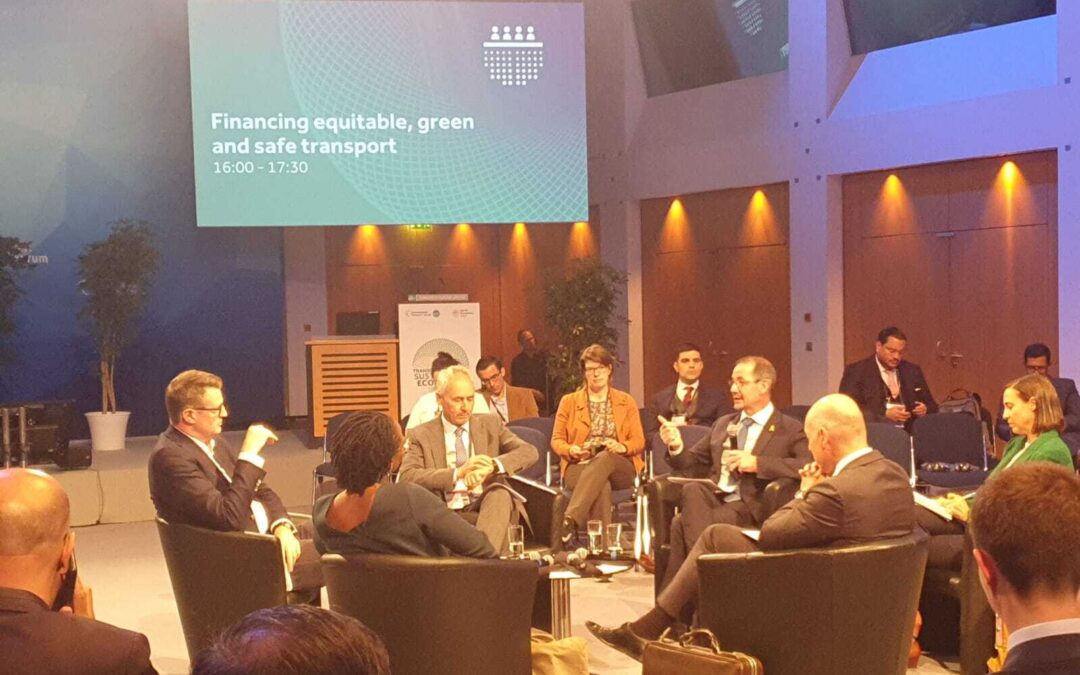A panel session titled “Financing Equitable, Green, and Safe Transport” was held yesterday as part of the International Transport Forum Summit 2023 in Leipzig, Germany. The session aimed to discuss the critical role of infrastructure financing in improving equity, achieving climate policy goals, and fostering economic growth. The panel comprised five key stakeholders in investment for clean transport, safer roads, and more equitable mobility.
The session began with introductions of the panelists, which included Kees van der Burg, Vice Minister of Mobility in the Netherlands; Patrick Wendeler, CEO of Europa BP; Nneka Henry, Head of the UN Road Safety Fund; Rob McInerney, CEO of iRAP and Agustina Calatayud, Group Head at IDB (Inter-American Investment Bank).
The discussion revolved around three key issues: road safety, climate change, and more equitable mobility. iRAP CEO Rob McInerney shared insights on results-based financing for safer roads. iRAP has been collaborating with governments, development banks, and NGOs for over two decades to improve infrastructure safety. The iRAP team, along with its partners, have also identified the economic returns on investing in road safety, with partners achieving not only significant reductions in death and injury rates, but also financial benefits.
Rob highlighted the importance of scaling up results-based financing and the establishment of common safety standards across different countries. He discussed the collaboration between iRAP and the World Bank, IDB, and other development banks to create innovative private finance options for road safety, such as safety bonds and impact bonds. These financing mechanisms aim to accelerate investments in safer roads, saving lives and reducing costs associated with road trauma.
Nneka Henry, from the UN Road Safety Fund, shared insights on infrastructure-related funding requests received and emerging trends. She emphasized the need for investments that align with the Sustainable Development Goals (SDGs) and mentioned the growing focus on more equitable mobility. The discussion highlighted the opportunities for addressing road safety and promoting equitable mobility in different regions.
Kees van der Burg, representing the Netherlands, discussed the challenges faced in maintaining progress in cycling safety and the efforts being made to regain momentum. He highlighted initiatives related to safe and accessible cycling infrastructure, global capacity building on cycling infrastructure through COP27, and the ambition to establish a global active mobility fund.
Agustina Calatayud addressed the role of multilateral development banks (MDBs) in promoting sustainable transport projects that are transparent, accountable, and responsive to local needs. She also discussed strategies to promote the adoption of clean and energy-efficient technologies in the transport sector. The importance of collaboration between MDBs and civil society was emphasized.
Patrick Wendeler from Europa BP discussed the company’s perspective on policy and regulatory systems that promote low-carbon innovation and technology. She shared BP’s investments in electrification of mobility and highlighted the need for government support in specific market segments. The panel also discussed the challenges and responsibilities of businesses like BP in developing sustainable alternative fuels, particularly for aviation.
The session concluded with discussions on sustainable aviation fuels (SAF), equity considerations, and the intersection of safety, climate policy, and equitable mobility. The panelists emphasized the importance of safety in achieving equitable mobility and identified areas where the three key themes overlapped.
The panel session provided valuable insights into financing mechanisms for safer roads, funding trends in infrastructure, the role of MDBs, and the need for collaboration between government, businesses, and international organizations. The discussions highlighted the importance of investing in sustainable and equitable transport to achieve global goals and address pressing challenges such as road safety and climate change.
The death and injury of 100,000 people a day in road crashes is not sustainable. The good news is road safety investments in 3-star or better roads is cost effective and results-based financing is providing new mechanisms to unlock the win-win benefits of safer roads.

















